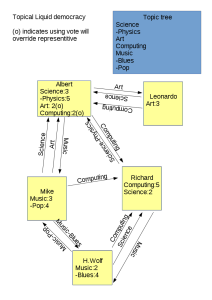For several months now, I’ve been working on various parts of RetroShare, including building a Scripting/RPC system(along with a selection of scripts), helping out with a Web user interface, Starting porting to Android and trialling new features such as parent-topics.
What really brings me to RetroShare is the desire to build a system of Liquid Democracy on its Friend-to-Friend (F2F) network. The idea of a F2F network is that you only connect *directly to* your contacts, there is no server or central point of failure/censorship/corruption.
By passing messages on – within about 7 hops, you could still reach anyone in the world.
In my view of Liquid Democracy, one of the most important elements is allowing many Representatives for different Topics, as opposed to one representative for everything.
Another is Forming a “Tree” of topics, allowing Votes to be passed up the tree.
This means that you will be able to be well represented by someone knowledgeable who you trust in each topic, or an even more specialised expert who they trust.
Below is a simplified diagram of how this would work on a small scale – I hope it still illustrates well how such a system would be able to scale up while providing good representation for all participants in each topic.
The system of liquid democracy I aim to build requires the following features to be added to the upcoming “Posted Links” links system in RetroShare:
-Each of your contacts can be your representative for any given topic (or sub-topic).
-Any Topic may be created as a sub-topic to build a hierarchy of topics
–Your Representative in a sub-topic Also represents your representees in that topic.
“Posted Links” is a currently un-finished feature in Retroshare that can be thought of as similar to Reddit – But of course with no central server. Anyone can create a Topic, or join a list of existing Topics. In each topic, a post consists of a link, some text, a vote record, and a tree of voteable comments. It already implements A large portion of the system I wish to build.
One of the biggest challenges is the scale of “Anonymity vs Accountability”. Amongst other things Anonymous voting makes controlling a voter harder, but also makes falsifying votes easier. One tool I am developing, which could help ensure votes are real, is a “Global Peer Connection map” which could be used to display where votes are coming from, or the “flow of representation” similar to the chart above. I will however attempt to maximise Anonymity without compromising the system.
I would like to thank Peter Anderson of VocalEyes for introducing me to the concept of liquid democracy, and look forward to further future collaboration. I am also working with Change The Future to help make democracy a reality.



